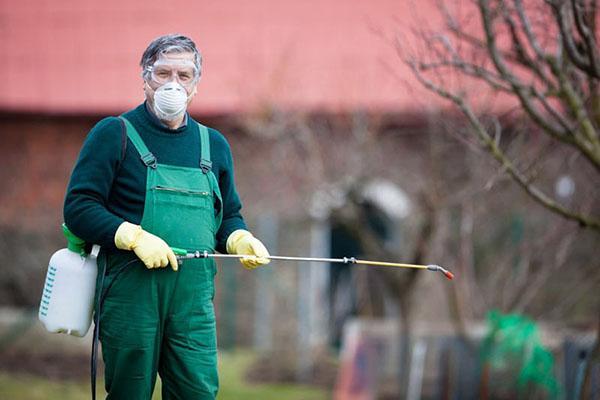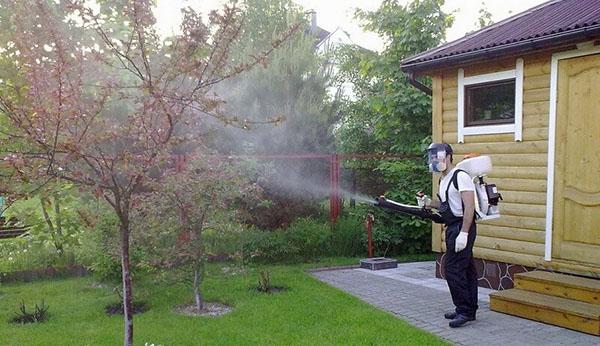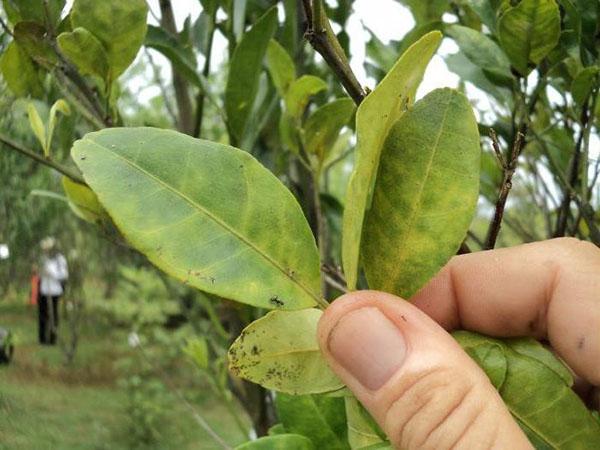Systemic insecticides for fruit trees - list and application features
 Systemic insecticides for fruit trees are preparations that are used to treat plants from harmful insects. They are effective for both treatment and prevention of pests. Insects can reduce yields or completely destroy plants. These preparations are used for irrigation, as well as for spraying their aerial parts. They differ in the active substance, method of administration and dosage, but have a similar mechanism of action.
Systemic insecticides for fruit trees are preparations that are used to treat plants from harmful insects. They are effective for both treatment and prevention of pests. Insects can reduce yields or completely destroy plants. These preparations are used for irrigation, as well as for spraying their aerial parts. They differ in the active substance, method of administration and dosage, but have a similar mechanism of action.
Features and mechanism of action

Compared to analogues of other groups, system tools demonstrate a number of advantages:
- long period of action - most drugs continue to work for a month after treatment;
- modern drugs are broad-spectrum insecticides that destroy different types of insects and pests;
- the ability to use for prevention, unlike many other types of insecticides;
- ease of use - there are options for home or industrial use on sale, with detailed instructions included;
- resistance to precipitation - unlike other types of insecticides, they accumulate in plant sap and are not washed out with water.
Systemic drugs are much more effective against pests than biological plant insecticides and contact agents. Their only drawback is that their effect does not appear immediately after application. From the moment of spraying the plant or watering with the addition of an insecticide, time must pass before it is absorbed. However, if you use the drugs regularly, for prophylaxis, as well as alternate products with a different spectrum of action, you can avoid the appearance of pests in the garden.
Modern techniques allow the manufacture of special insecticides that are safe for bees... However, they are also used with all safety precautions and do not process plants during the flowering period.
The most effective systemic insecticides for fruit trees
 The list of systemic insecticides for fruit trees includes a huge number of names. They differ in name and concentration of the active substance, but most of them are produced on the basis of imidacloprid. Such preparations act on insect pests that are located both on the bark and leaves, as well as on those that remain hidden in the underground part and the fruits of plants.
The list of systemic insecticides for fruit trees includes a huge number of names. They differ in name and concentration of the active substance, but most of them are produced on the basis of imidacloprid. Such preparations act on insect pests that are located both on the bark and leaves, as well as on those that remain hidden in the underground part and the fruits of plants.
Speed
 Insecticide Skor belongs to the systemic category and is used to treat and prevent fruit trees from insect pests. It has established itself as an effective remedy against apple and pear scab, as well as curly leaves in peach... Its active ingredient is difenoconazole. The drug has a quick onset of action, since it is absorbed within the first 30 minutes after application. Another advantage is economical consumption. One bottle containing 10 ml of the concentrated product is enough for dilution in 500 liters of water. One tree will need no more than 5 liters of working solution, and no more than 3 treatments are carried out during the season.
Insecticide Skor belongs to the systemic category and is used to treat and prevent fruit trees from insect pests. It has established itself as an effective remedy against apple and pear scab, as well as curly leaves in peach... Its active ingredient is difenoconazole. The drug has a quick onset of action, since it is absorbed within the first 30 minutes after application. Another advantage is economical consumption. One bottle containing 10 ml of the concentrated product is enough for dilution in 500 liters of water. One tree will need no more than 5 liters of working solution, and no more than 3 treatments are carried out during the season.
To protect against certain varieties of pests, you can choose a narrow spectrum. So, against caterpillars and thrips, the drug Nocturne, an insecticide of contact action, has proven itself well.
Shaman
 Shaman is a combined drug that has both contact and systemic effects on the pest organism. It contains substances such as chlorpyrifos and cypermethrin. Together, they affect the moth, moth, aphid, leafworm, ticks and other pests of fruit trees. It is used by spraying overground parts of trees, after diluting the concentrate with water. Upon contact with pests, the substance causes complete paralysis of their nervous system. After that, they no longer pose a danger to cultivated plants.
Shaman is a combined drug that has both contact and systemic effects on the pest organism. It contains substances such as chlorpyrifos and cypermethrin. Together, they affect the moth, moth, aphid, leafworm, ticks and other pests of fruit trees. It is used by spraying overground parts of trees, after diluting the concentrate with water. Upon contact with pests, the substance causes complete paralysis of their nervous system. After that, they no longer pose a danger to cultivated plants.
For several more weeks, the drug prevents re-infection and eliminates those individuals that remained after the first treatment.
Engio
 Most systemic insecticides are most effective against certain insect species. However, this drug has a wide spectrum of action and belongs to the group of combined agents. It has both systemic and contact effects. Thanks to this, the drug not only destroys all insects at the larval and adult stages, but also provides persistent and long-term prevention of infection. Insecticide Engio is suitable for protecting apple and other fruit trees from leaf rollers, sawers, moths and many other pests. It is diluted with water and used to spray the aboveground parts of plants.
Most systemic insecticides are most effective against certain insect species. However, this drug has a wide spectrum of action and belongs to the group of combined agents. It has both systemic and contact effects. Thanks to this, the drug not only destroys all insects at the larval and adult stages, but also provides persistent and long-term prevention of infection. Insecticide Engio is suitable for protecting apple and other fruit trees from leaf rollers, sawers, moths and many other pests. It is diluted with water and used to spray the aboveground parts of plants.
The main advantage of the Angio preparation is its composition. Here are two active ingredients that have a parallel effect on pests:
- thiamethoskam - a systemic substance that accumulates in plant sap and destroys insects for several more weeks;
- lambda-cyhalothrin is a contact substance that has a detrimental effect on pests in adult and larval stages.
For both treatment and prevention of fruit trees, it is important to choose those preparations that are suitable for a particular type of plant. So, against strawberries or Valverde peas, insecticides for an apple tree will be ineffective and vice versa.
Confidor Maxi
 Confidor Maxi is another combined insecticide that is suitable for therapeutic and prophylactic treatments of apple, plum and other fruit trees in the garden. It is effective against moths, moths, aphids and sucking pests. Thanks to its well-chosen composition, the agent acts on insects immediately after treatment. The period of its further protection is up to 15 days. It can be used in hot and rainy weather. The components of the preparation are evenly distributed over the rhizome and aerial parts of plants. They provide lasting prophylaxis against various types of pests. 1 g of the preparation is enough for breeding in 10-14 liters of water and processing 4-6 trees.
Confidor Maxi is another combined insecticide that is suitable for therapeutic and prophylactic treatments of apple, plum and other fruit trees in the garden. It is effective against moths, moths, aphids and sucking pests. Thanks to its well-chosen composition, the agent acts on insects immediately after treatment. The period of its further protection is up to 15 days. It can be used in hot and rainy weather. The components of the preparation are evenly distributed over the rhizome and aerial parts of plants. They provide lasting prophylaxis against various types of pests. 1 g of the preparation is enough for breeding in 10-14 liters of water and processing 4-6 trees.
The list of contact insecticides includes Ripcord, Karbofos, Arrivo and other drugs. They are also used for treatments, but are only effective when they come into direct contact with pests. It is advisable to use them when larvae or mature insects already appear on the plants, which feed on aerial parts or crops. Systemic insecticides have a different mechanism of action. They are able to accumulate in plant sap and provide powerful pest prevention for several weeks.